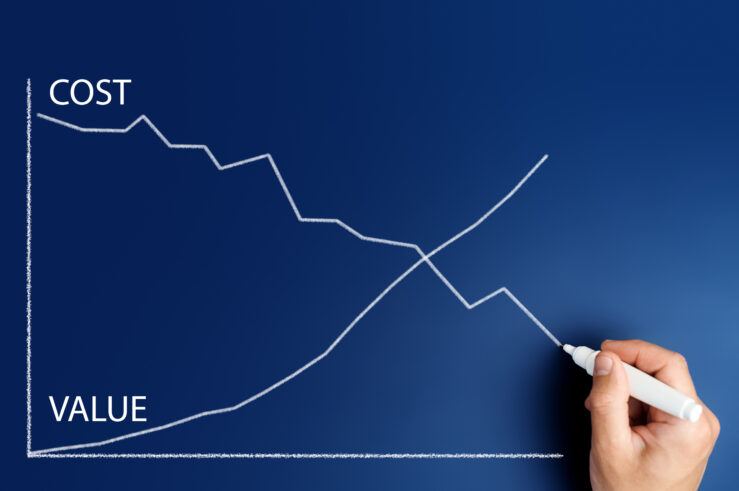Showing archive for: “Market Definition”
Chair Khan’s Latest Flawed Perspective on Mergers Ignores Empirics and Sound Economics
Federal Trade Commission (FTC) Chair Lina Khan missed the mark once again in her May 6 speech on merger policy, delivered at the annual meeting of the International Competition Network (ICN). At a time when the FTC and U.S. Justice Department (DOJ) are presumably evaluating responses to the agencies’ “request for information” on possible merger-guideline ... Chair Khan’s Latest Flawed Perspective on Mergers Ignores Empirics and Sound Economics
Hunting for Labor-Market Monopsonies (and Giffen Goods)
If you wander into an undergraduate economics class on the right day at the right time, you might catch the lecturer talking about Giffen goods: the rare case where demand curves can slope upward. The Irish potato famine is often used as an example. As the story goes, potatoes were a huge part of the ... Hunting for Labor-Market Monopsonies (and Giffen Goods)
Labor Antitrust Analysis Should Focus on Actual Anticompetitive Agreements
Biden administration enforcers at the U.S. Justice Department (DOJ) and the Federal Trade Commission (FTC) have prioritized labor-market monopsony issues for antitrust scrutiny (see, for example, here and here). This heightened interest comes in light of claims that labor markets are highly concentrated and are rife with largely neglected competitive problems that depress workers’ income. ... Labor Antitrust Analysis Should Focus on Actual Anticompetitive Agreements
Concentration Study Further Undermines Narrative that US Competition Has Sharply Declined
A new scholarly study of economic concentration sheds further light on the flawed nature of the Neo-Brandeisian claim that the United States has a serious “competition problem” due to decades of increasing concentration and ineffective antitrust enforcement (see here and here, for example). In a recent article, economist Yueran Ma—assistant professor at the University of ... Concentration Study Further Undermines Narrative that US Competition Has Sharply Declined
Attention Markets: They Know Them When they See Them
A raft of progressive scholars in recent years have argued that antitrust law remains blind to the emergence of so-called “attention markets,” in which firms compete by converting user attention into advertising revenue. This blindness, the scholars argue, has caused antitrust enforcers to clear harmful mergers in these industries. It certainly appears the argument is ... Attention Markets: They Know Them When they See Them
Assessing Less Restrictive Alternatives and Interbrand Competition in Epic v Apple
The International Center for Law & Economics (ICLE) filed an amicus brief on behalf of itself and 26 distinguished law & economics scholars with the 9th U.S. Circuit Court of Appeals in the hotly anticipated and intensely important Epic Games v Apple case. A fantastic group of attorneys from White & Case generously assisted us ... Assessing Less Restrictive Alternatives and Interbrand Competition in Epic v Apple
In Apple v Epic, 9th Circuit Should Remember that Antitrust Forbids Enhancing, not Exercising, Market Power
On March 31, I and several other law and economics scholars filed an amicus brief in Epic Games v. Apple, which is on appeal to the U.S. Court of Appeals for Ninth Circuit. In this post, I summarize the central arguments of the brief, which was joined by Alden Abbott, Henry Butler, Alan Meese, Aurelien ... In Apple v Epic, 9th Circuit Should Remember that Antitrust Forbids Enhancing, not Exercising, Market Power
The DMA and Antitrust: A Liaison Dangereuse
As the European Union’s Digital Markets Act (DMA) has entered the final stage of its approval process, one matter the inter-institutional negotiations appears likely to leave unresolved is how the DMA’s the relationship with competition law affects the very rationale and legal basis for the intervention. The DMA is explicitly grounded on the questionable assumption ... The DMA and Antitrust: A Liaison Dangereuse
Does the Market Know Something the FTC Doesn’t?
During the exceptional rise in stock-market valuations from March 2020 to January 2022, both equity investors and antitrust regulators have implicitly agreed that so-called “Big Tech” firms enjoyed unbeatable competitive advantages as gatekeepers with largely unmitigated power over the digital ecosystem. Investors bid up the value of tech stocks to exceptional levels, anticipating no competitive ... Does the Market Know Something the FTC Doesn’t?
FTC-DOJ RFI on Merger Guidelines: The Agencies Should Proceed with Caution
The Jan. 18 Request for Information on Merger Enforcement (RFI)—issued jointly by the Federal Trade Commission (FTC) and the U.S. Justice Department (DOJ)—sets forth 91 sets of questions (subsumed under 15 headings) that provide ample opportunity for public comment on a large range of topics. Before chasing down individual analytic rabbit holes related to specific ... FTC-DOJ RFI on Merger Guidelines: The Agencies Should Proceed with Caution
Amazon Italy’s Efficiency Offense
Early last month, the Italian competition authority issued a record 1.128 billion euro fine against Amazon for abuse of dominance under Article 102 of the Treaty on the Functioning of the European Union (TFEU). In its order, the Agenzia Garante della Concorrenza e del Mercato (AGCM) essentially argues that Amazon has combined its Amazon.it marketplace ... Amazon Italy’s Efficiency Offense
Merger Control’s Misaligned Incentives
Antitrust policymakers around the world have taken a page out of the Silicon Valley playbook and decided to “move fast and break things.” While the slogan is certainly catchy, applying it to the policymaking world is unfortunate and, ultimately, threatens to harm consumers. Several antitrust authorities in recent months have announced their intention to block ... Merger Control’s Misaligned Incentives
















